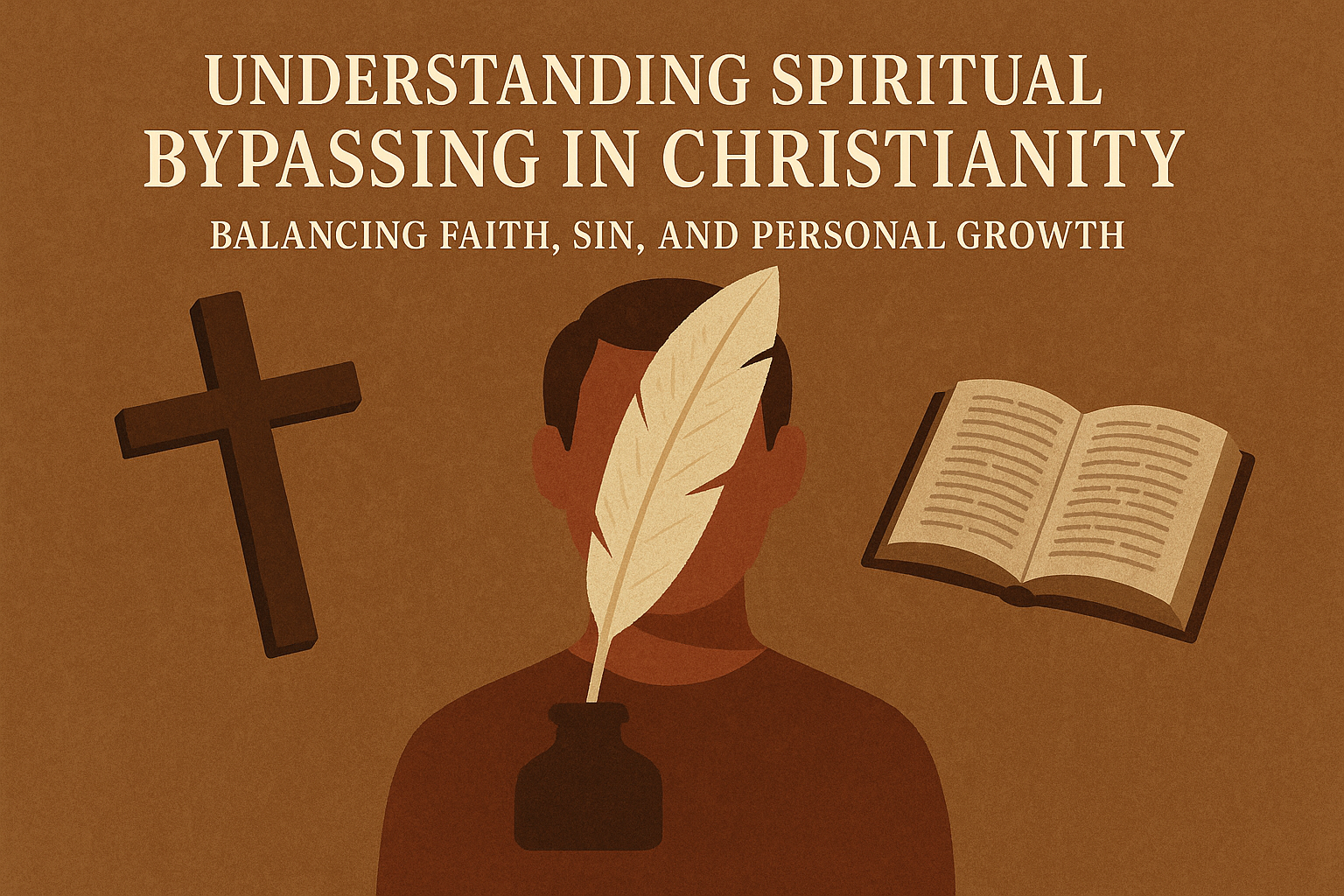Understanding Spiritual Bypassing in Christianity: Balancing Faith, Sin, and Personal Growth
Discover how misapplied Christian teachings can lead to spiritual bypassing, why the church’s focus on original sin and faith sometimes overshadows being a good person, and how the Bible guides believers to avoid bypassing for holistic growth.
What Is Spiritual Bypassing and How Does Christianity Contribute?
 Spiritual bypassing—using spiritual beliefs to avoid emotional, psychological, or practical challenges—is a subtle but common issue in many faith communities, including Christianity. While Christianity offers profound teachings on salvation and grace, misapplying its core doctrines, such as universal sin and faith in Jesus, can lead to bypassing personal growth.
Spiritual bypassing—using spiritual beliefs to avoid emotional, psychological, or practical challenges—is a subtle but common issue in many faith communities, including Christianity. While Christianity offers profound teachings on salvation and grace, misapplying its core doctrines, such as universal sin and faith in Jesus, can lead to bypassing personal growth.
How Misapplied Christianity Leads to Spiritual Bypassing
- Overemphasis on Salvation as a Quick Fix
Bible passages like Romans 10:9 (“If you declare with your mouth, ‘Jesus is Lord,’ and believe in your heart that God raised him from the dead, you will be saved”) emphasize salvation through faith. While powerful, this can be misinterpreted as an instant solution to all problems. Believers might assume that accepting Jesus resolves emotional struggles, bypassing the need for therapy or self-reflection. For example, someone with anxiety might suppress their feelings, saying, “I’m saved, so I shouldn’t worry,” instead of addressing the root cause. - Minimizing Personal Responsibility
Verses like Romans 3:23 (“For all have sinned and fall short of the glory of God”) highlight universal sinfulness. If overly focused on, this can lead to excusing harmful behaviors with “we’re all sinners,” avoiding accountability. A person might justify anger or dishonesty by leaning on Jesus’ forgiveness, bypassing the work of changing their actions. - Dismissing Emotional Pain
Teachings like John 3:16 (“For God so loved the world that he gave his one and only Son…”) focus on eternal life through Jesus. When salvation is prioritized over present struggles, emotional pain might be dismissed as irrelevant. Believers might be told to “just pray” for depression, bypassing professional help, which can invalidate real suffering.
These misapplications often stem from a shallow interpretation of scripture, where salvation becomes a catch-all solution, discouraging holistic growth. This is where the critique from some atheists gains traction, as they observe the church’s focus on doctrine over practical goodness.
The Atheist Critique: Church Focus on Original Sin and Faith vs. Being a Good Person
Many atheists argue that Christianity places too much emphasis on original sin and faith at the expense of ethical behavior. They point out that the church often prioritizes doctrinal beliefs—such as accepting Jesus as Savior (John 14:6, Acts 4:12)—over living a life of kindness, compassion, and integrity, which they see as central to being a “good person.”
Why the Church Focuses on Original Sin and Faith
- Doctrinal Foundation
The concept of original sin, rooted in Romans 5:12 (“sin came into the world through one man, and death through sin”), underscores humanity’s need for salvation. Passages like Ephesians 2:8-9 (“For it is by grace you have been saved, through faith… not by works”) emphasize that salvation comes through faith, not human effort. This shapes the church’s focus, as it sees eternal reconciliation with God as the ultimate goal. - Cultural Reinforcement
Many Christian communities reinforce these doctrines through sermons, worship, and evangelism, often framing faith as the primary marker of spiritual health. This can lead to a culture where confessing faith overshadows addressing personal flaws or societal issues, reinforcing spiritual bypassing.
The Atheist Perspective
Atheists often argue that being a good person—acting with empathy, honesty, and justice—should take precedence over religious beliefs. They point to examples of nonbelievers who live ethically without faith, questioning why Christianity focuses on sin and salvation rather than practical goodness. For instance, an atheist might volunteer at a shelter or advocate for equality, arguing that these actions matter more than doctrinal adherence.
This critique highlights a real tension: when the church overemphasizes original sin and faith, it risks neglecting the call to “love your neighbor” (Matthew 22:39) or to act justly (Micah 6:8). This can alienate those who value ethical living and reinforce bypassing by prioritizing spiritual status over personal growth.
How the Bible Teaches Us to Avoid Spiritual Bypassing
Despite these challenges, the Bible itself offers guidance to prevent spiritual bypassing, promoting a faith that integrates self-examination, emotional honesty, and practical action. Below are key passages that encourage a holistic approach, countering the tendency to avoid personal or emotional work.
1. Self-Examination and Accountability
- James 1:22-25 (NIV):
“Do not merely listen to the word, and so deceive yourselves. Do what it says… Whoever looks intently into the perfect law that gives freedom, and continues in it—not forgetting what they have heard, but doing it—they will be blessed in what they do.”
How it helps: James urges believers to act on God’s word, not just profess faith. This counters bypassing by encouraging self-reflection and behavioral change, such as addressing anger or dishonesty, rather than hiding behind salvation.
- 1 John 1:9 (ESV):
“If we confess our sins, he is faithful and just to forgive us our sins and to cleanse us from all unrighteousness.”
How it helps: Confessing specific sins requires honesty, preventing believers from dismissing issues with general claims of forgiveness. This fosters accountability and growth.
2. Emotional Honesty and Validation
- Psalm 34:18 (NIV):
“The Lord is close to the brokenhearted and saves those who are crushed in spirit.”
How it helps: This verse validates emotional pain, showing that God meets people in their struggles. It encourages believers to process grief or sadness rather than bypassing it with spiritual optimism.
- Lamentations 3:19-23 (ESV):
“Remember my affliction and my wanderings… But this I call to mind, and therefore I have hope: The steadfast love of the Lord never ceases.”
How it helps: The writer models expressing despair before turning to hope, showing that faith can coexist with emotional honesty, discouraging quick spiritual fixes.
3. Faith Through Action
- James 2:17 (NIV):
“Faith by itself, if it is not accompanied by action, is dead.”
How it helps: James links faith to tangible actions, like helping others or addressing personal flaws. This challenges bypassing by urging believers to live out their faith practically, aligning with the atheist call to “be a good person.”
- Galatians 6:2 (NIV):
“Carry each other’s burdens, and in this way you will fulfill the law of Christ.”
How it helps: This call to support others fosters empathy, discouraging dismissive spiritual advice and encouraging engagement with real human needs.
4. Holistic Growth and Wisdom
- Romans 12:2 (NIV):
“Be transformed by the renewing of your mind.”
How it helps: Transformation involves emotional and intellectual growth, encouraging believers to address psychological issues alongside faith, preventing bypassing through holistic renewal.
- Proverbs 15:22 (NIV):
“Plans fail for lack of counsel, but with many advisers they succeed.”
How it helps: Seeking counsel, including professional help, aligns with faith, countering the tendency to rely solely on spiritual solutions.
These verses show that the Bible advocates a faith that embraces emotional honesty, accountability, and action—qualities that align with being a “good person” while rooted in spiritual purpose.
Balancing Faith and Goodness: A Path Forward
 The atheist critique has merit when the church overemphasizes original sin and faith at the expense of ethical living. However, the Bible itself offers a corrective, encouraging believers to integrate faith with personal growth and action. To avoid spiritual bypassing and address this critique, consider these steps:
The atheist critique has merit when the church overemphasizes original sin and faith at the expense of ethical living. However, the Bible itself offers a corrective, encouraging believers to integrate faith with personal growth and action. To avoid spiritual bypassing and address this critique, consider these steps:
- Reflect Honestly: Use James 1:22-25 to examine your actions and emotions regularly, perhaps through journaling or trusted friends, ensuring faith leads to growth.
- Validate Emotions: Follow Psalm 34:18 by bringing struggles to God and seeking support, recognizing that emotional pain is valid and not a sign of weak faith.
- Act on Faith: Embrace James 2:17 by living out your beliefs through kindness, justice, and service, showing that faith and goodness go hand in hand.
- Seek Holistic Help: Combine prayer (James 1:5) with practical resources like therapy or community support (Proverbs 15:22), viewing them as complementary to faith.
- Engage Empathetically: Practice Galatians 6:2 by listening to others’ struggles without rushing to spiritual solutions, fostering a faith that meets people where they are.
Direct Teachings from Jesus on Being a Good Person
Jesus himself emphasized ethical behavior and compassion as central to being a good person, aligning with the call to integrate faith with action and countering spiritual bypassing. Here are some of his direct teachings:
- The Golden Rule (Matthew 7:12):
“So in everything, do to others what you would have them do to you, for this sums up the Law and the Prophets.”
Jesus provides a practical standard for ethical living: treat others with the kindness you desire, emphasizing empathy over mere spiritual profession.
- Love Your Neighbor (Matthew 22:37-39):
“Jesus replied: ‘Love the Lord your God with all your heart and with all your soul and with all your mind.’ This is the first and greatest commandment. And the second is like it: ‘Love your neighbor as yourself.’”
Loving your neighbor as yourself requires tangible acts of care, directly addressing how to be a good person through compassion.
- The Good Samaritan (Luke 10:36-37):
“‘Which of these three do you think was a neighbor to the man who fell into the hands of robbers?’ The expert in the law replied, ‘The one who had mercy on him.’ Jesus told him, ‘Go and do likewise.’”
Jesus teaches that being a good person means showing mercy to anyone in need, prioritizing action over religious status.
- Judging Others (Matthew 7:3-5):
“Why do you look at the speck of sawdust in your brother’s eye and pay no attention to the plank in your own eye?… First take the plank out of your own eye, and then you will see clearly to remove the speck from your brother’s eye.”
Jesus urges self-reflection before judging others, fostering humility and personal growth as part of being a good person.
- Serving Others (Matthew 20:26-28):
“Whoever wants to become great among you must be your servant… just as the Son of Man did not come to be served, but to serve, and to give his life as a ransom for many.”
Greatness comes through serving others, reflecting the call to prioritize others’ needs in daily life.
These teachings from Jesus reinforce that being a good person is at the heart of Christian faith, complementing the Bible’s broader guidance on avoiding spiritual bypassing through action, empathy, and self-awareness.
Conclusion: A Faith That Grows, Not Bypasses
 Christianity, when misapplied, can lead to spiritual bypassing by overemphasizing salvation and sin, sometimes at the expense of personal growth and ethical living. The church’s focus on original sin and faith, while doctrinally significant, can overshadow the call to be a good person, as some atheists rightly observe. Yet, the Bible itself—through verses like James 2:17, Psalm 34:18, and Romans 12:2—teaches a holistic faith that integrates emotional honesty, accountability, and action, preventing bypassing and aligning with the values of compassion and integrity.
Christianity, when misapplied, can lead to spiritual bypassing by overemphasizing salvation and sin, sometimes at the expense of personal growth and ethical living. The church’s focus on original sin and faith, while doctrinally significant, can overshadow the call to be a good person, as some atheists rightly observe. Yet, the Bible itself—through verses like James 2:17, Psalm 34:18, and Romans 12:2—teaches a holistic faith that integrates emotional honesty, accountability, and action, preventing bypassing and aligning with the values of compassion and integrity.
By embracing these teachings, Christians can live out a faith that honors both spiritual salvation and practical goodness, addressing the atheist critique while fostering personal and communal growth. Let’s move toward a faith that doesn’t bypass challenges but faces them with courage, empathy, and action.







